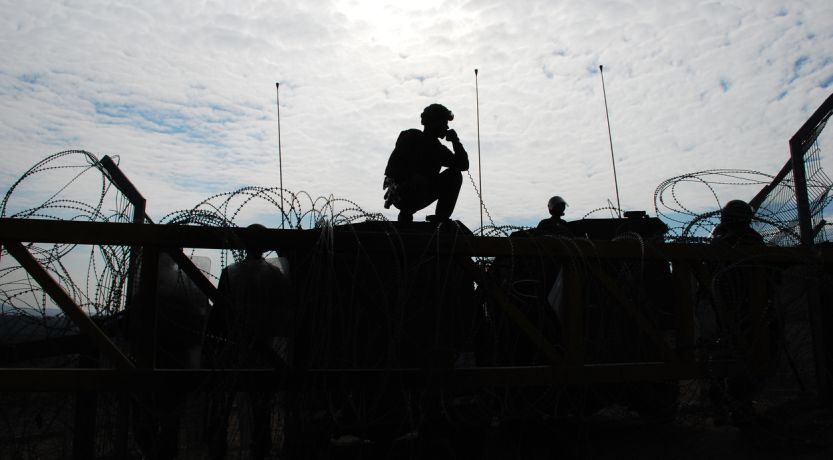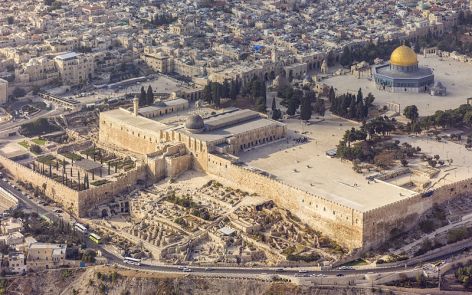What’s Behind the War Between Israel and Hamas?
On Oct. 7, Hamas launched a massive and savage attack on Israel. Israel responded by launching missiles into Gaza. How does this fit into Bible prophecy?

On Saturday, Oct. 7, many in Israel were celebrating the Jewish holiday Shemini Atzeret. Others were gathered at a festival enjoying music. Then, without any warning, rockets and gunfire began. The chaos quickly escalated into a savage massacre and the kidnapping of around 200 people, including children, women and older people. Most were Israeli citizens, but citizens of a number of other nations were also dragged across the border.
To date, over 2,750 have been killed by Israeli retaliatory strikes in the Gaza Strip. In the first week, more than 250,000 people were displaced in Gaza because of the Israeli air strikes. Israel called on more than a million Gazans to head to the southern part of the Gaza Strip.
Shortly after the Hamas attack, Israeli Prime Minister Benjamin Netanyahu declared the Jewish state to be at war with Hamas and vowed to “crush and destroy Hamas” with immediate retaliation. Israeli Defense Minister Yoav Gallant said, “We will wipe this thing called Hamas, ISIS-Gaza, off the face of the earth. It will cease to exist.”
What is Hamas?
For people to better understand what is transpiring in Israel, a quick history lesson can be helpful.
When Israel became a nation in 1948, Palestinian refugees were settled in two areas, the Gaza Strip and the West Bank. The Gaza Strip is a narrow, 25-mile strip of land bordering the Mediterranean Sea, Israel and Egypt. For several years, Egypt controlled this narrow strip of land. But the strip came under Israeli occupation during the 1967 Six-Day War.
Hamas is considered a terrorist group by many nations and is supported by and receives supplies and funding from Iran, the mortal enemy of Israel.
For many years, Jewish settlers lived in the Gaza Strip alongside Palestinians. However, in 2000, the Palestinians began a violent uprising that resulted in Israel’s vacating Gaza in 2005, removing military forces and nearly 10,000 Jewish settlers. At that point, the Palestinian Authority took full control of the Gaza Strip.
However, in 2006, Hamas won elections and in 2007 subsequently expelled the Fatah-controlled Palestinian Authority—taking complete control over Gaza, with no elections ever since.
This is significant because, unlike the Palestinian Authority (which still governs the West Bank), Hamas doesn’t recognize Israel’s right to exist. Because of that, the situation in the Gaza Strip, which today is home to over 2 million people, has remained a powder keg—as this most recent savage attack clearly shows.
Hamas is considered a terrorist group by many nations and is supported by and receives supplies and funding from Iran, the mortal enemy of Israel.
To learn more about the history of this conflict, read “Middle East Conflict.”
What prompted this recent attack?
After Hamas took control of the Gaza Strip in 2007, Israel responded by enacting an air, sea and land blockade. Israel controls who can enter and leave this land and what supplies, including food, water and fuel, are allowed in and out of Gaza.
As living conditions have worsened in the Gaza Strip under Hamas, some have placed all the blame on Israel, calling Gaza an “open-air prison.” But one must ask, can you expect things to get better if you are biting the hand that feeds you?
Is it a mere coincidence that this attack happened nearly 50 years after the Yom Kippur War, which was also a surprise attack on Israel? That conflict ended after the Israelis made significant advances into enemy territory, leading Egypt to be willing to agree to a cease-fire. However, in this war it seems the Hamas regime does not want peace.
Before this recent attack, there have been four deadly battles between Israel and Hamas. Even between these battles, Hamas often showed its disdain for Israel by launching small drone attacks and occasionally firing rockets into Israeli territory.
The unrest and difficult living conditions seem to have motivated Hamas to attack. But since the attack, conditions are only worsening.
Israel’s defense minister ordered a “complete siege” of Gaza, cutting off fuel, electricity and even food and water from Gaza. Gaza’s only power plant has been shut down, leaving many places, including hospitals, without electricity.
Some 360,000 reservists have been called to report for duty as Israel prepares for a ground invasion. This will undoubtedly result in even more bloodshed on both sides.
Because of Hamas’ hatred of Israel and Israel’s firm resolve to stop Hamas, Prime Minister Netanyahu believes this war will be a prolonged conflict.
Why the continual fighting in Israel?
As brutal and savage as this recent attack was, fighting in Israel is nothing new. For centuries, the Jewish people have been persecuted, disdained and attacked by those around them.
The Bible reveals the real reason for all this fighting—and how it will ultimately end.
The conflict’s origins go back some 4,000 years when a man named Abram (whose name God later changed to Abraham) had two sons, Ishmael and Isaac.
God had promised Abraham and his wife Sarah a son even though they were past the age of childbearing (Genesis 15:1-4). Ishmael was born first, but to Sarah’s Egyptian handmaid, Hagar (Genesis 16:1-2, 15). Isaac was born several years later to Sarah, just as God had promised (Genesis 21:1-7).
One of Isaac’s sons was Jacob, whose name God changed to Israel (Genesis 32:28). Jacob had 12 sons, one of whom was named Judah. Today, the nation of Israel primarily consists of the descendants of Judah (along with some from Benjamin and Levi). The descendants of Ishmael are found among many of the Arab peoples today. So the descendants of Ishmael surround Judah’s descendants.
Even though thousands of years have passed, the animosity between these two half-brothers has not healed.
Notice what Jacob foretold about the end-time descendants of his son Judah: “Judah, my son, is a young lion that has finished eating its prey. Like a lion he crouches and lies down; like a lioness—who dares to rouse him?” (Genesis 49:9, New Living Translation).
This could describe how Israel—just like a lion—retaliates quickly when provoked.
What should we expect from this war?
This current conflict is not the first for the nation of Israel, nor will it be its last. This ancient hatred between the descendants of Ishmael and Isaac will continue until the return of Jesus Christ.
And the real focal point is the city of Jerusalem.
The real focal point of the conflict is the city of Jerusalem. 
The whole world is now focused on this region. Israel and Gaza are now getting more attention than the ongoing Russian-Ukrainian War.
Jesus Christ said that a marked increase in wars, diseases, famines and natural disasters would be a sign that His second coming is near (Matthew 24:6-7).
Yes, the world is watching this war between Israel and Hamas. There are growing concerns that the Lebanese terrorist group Hezbollah will escalate its attacks on Israel’s northern border, creating two fronts. And as the unrest in the Middle East worsens, the Bible shows us that it will become the center of the biggest battle in human history.
The Bible prophesies the emergence of a European superpower called the “king of the North.” This coming union of 10 nations or groups of nations (also called the “beast”) will be powerful and feared. Yet another power, called the “king of the South,” will challenge it. This power will likely be composed of multiple Muslim nations.
As the king of the North comes down to fight the king of the South, Jerusalem will be caught in the middle (Daniel 11:40-41). The savagery of Hamas will be exceeded by the brutality that will occur when Jerusalem is captured by the king of the North (Zechariah 14:2).
The fighting we are witnessing today between Israel and Hamas is not the final battle. Even if Israel succeeds and topples the Hamas terrorists, another group will take their place to antagonize Israel because of this ancient hatred.
Unfortunately, this present war will result in a trail of human carnage and suffering that will not end soon. We can also know there will be no lasting peace in the Middle East until Jesus Christ intervenes. Despite the continued talks of a Middle East peace plan and a “two-state solution” to the Israeli-Palestinian conflict, no lasting solution will be found in this age.
God will make Jerusalem a city of peace
Yet, despite all the fighting and hatred in Israel today, God the Father will send Jesus Christ to Jerusalem to end all conflict and establish the Kingdom of God on earth.
Zechariah 8 talks about the peace and tranquility in Jerusalem under Christ’s rule. Children will play without fear in the streets, people will not have their lives cut short by violence and other nations will even come to Jerusalem to learn God’s ways.
May God speed that day!
Photo credit:
iStock.com/Joel Carillet
Date Posted: October 17, 2023



